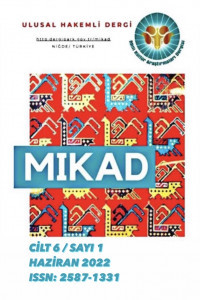ИҚТИСОДИЁТ ВА БАХТ: АДАБИЁТЛАР ТАҲЛИЛИ
Мазкур тадқиқотнинг мақсади иқтисодиёт ва бахт ўртасидаги боғлиқликни ўрганишдир. Ушбу мақсадда тадқиқотда адабиётларни тизимли таҳлили усулидан фойдаланилган. Таҳлил Дунё Бахтиёрлик Маълумотлар Базасидан ўрин олган маълумотларга асосланади. Таҳлил натижаларига кўра, иқтисодий ўсиш ва бахт ўртасида тўғридан-тўғри боғлиқлик мавжуд.
Anahtar Kelimeler:
бахт, адабиётлар таҳлили, иқтисодиёт
___
- Angeles, Luis. 2011. “A Closer Look at the Easterlin Paradox.” The Journal of Socio-Economics 40 (1): 67–73.
- Ball, Richard, and Kateryna Chernova. 2008. “Absolute Income, Relative Income, and Happiness.” Social Indicators Research 88 (3): 497–529.
- Baltatescu, Sergiu. 2006. “Transition Is over, Wait to See the Benefits: A Comparative Evaluation of the Effects of Post-Communist Transition on Life Satisfaction.” The End of Transitions.
- Bjørnskov, Christian. 2014. “Do Economic Reforms Alleviate Subjective Well-Being Losses of Economic Crises?” Journal of Happiness Studies 15 (1): 163–82.
- Bjørnskov, Christian, Nabanita Datta Gupta, and Peder J. Pedersen. 2008. “Analysing Trends in Subjective Well-Being in 15 European Countries, 1973–2002.” Journal of Happiness Studies 9 (2): 317–30.
- Bonasia, Mariangela, Oreste Napolitano, and Nicola Spagnolo. 2018. “Happy PIIGS?” Journal of Happiness Studies 19 (6): 1763–82.
- Cheung, Felix. 2018. “Income Redistribution Predicts Greater Life Satisfaction across Individual, National, and Cultural Characteristics.” Journal of Personality and Social Psychology 115 (5): 867.
- Clark, Andrew E., Paul Frijters, and Michael A. Shields. 2008. “Relative Income, Happiness, and Utility: An Explanation for the Easterlin Paradox and Other Puzzles.” Journal of Economic Literature 46 (1): 95–144.
- Di Tella, Rafael, and Robert MacCulloch. 2008. “Gross National Happiness as an Answer to the Easterlin Paradox?” Journal of Development Economics 86 (1): 22–42.
- Easterlin, Richard A. 1974. “Does Economic Growth Improve the Human Lot? Some Empirical Evidence.” In Nations and Households in Economic Growth, 89–125. Elsevier.
- ———. 2005. “Diminishing Marginal Utility of Income? Caveat Emptor.” Social Indicators Research 70 (3): 243–55.
- Fahey, Tony, and Emer Smyth. 2004. “The Link between Subjective Well-Being and Objective Conditions in European Societies.” European Values at the Turn of the Millennium 7: 57–80.
- Fischer, Claude S. 2008. “What Wealth-Happiness Paradox? A Short Note on the American Case.” Journal of Happiness Studies 9 (2): 219–26.
- Helliwell, John F., Haifang Huang, Shawn Grover, and Shun Wang. 2014. “Empirical Linkages between Good Government and National Well-Being.” National Bureau of Economic Research.
- Ouweneel, Р. 1987. “Geluk Volgt Welvaart. (Happiness Follows Welfare).” Economisch Statistische Berichten 3622: 840–42.
- Ovaska, Tomi, and Ryo Takashima. 2006. “Economic Policy and the Level of Self-Perceived Well-Being: An International Comparison.” The Journal of Socio-Economics 35 (2): 308–25.
- Rodríguez-Pose, Andrés, and Kristina Maslauskaite. 2012. “Can Policy Make Us Happier? Individual Characteristics, Socio-Economic Factors and Life Satisfaction in Central and Eastern Europe.” Cambridge Journal of Regions, Economy and Society 5 (1): 77–96.
- Senik, Claudia. 2014. “The French Unhappiness Puzzle: The Cultural Dimension of Happiness.” Journal of Economic Behavior & Organization 106: 379–401.
- Stevenson, Betsey, and Justin Wolfers. 2008. “Economic Growth and Subjective Well-Being: Reassessing the Easterlin Paradox.” National Bureau of Economic Research.
- Van Hemert, Dianne A., Fons JR Van De Vijver, and Ype H. Poortinga. 2002. “The Beck Depression Inventory as a Measure of Subjective Well-Being: A Cross-National Study.” Journal of Happiness Studies 3 (3): 257–86.
- Veenhoven, Ruut, and Michael Hagerty. 2006. “Rising Happiness in Nations 1946–2004: A Reply to Easterlin.” Social Indicators Research 79 (3): 421–36.
- ISSN: 2587-1331
- Yayın Aralığı: Yılda 2 Sayı
- Başlangıç: 2017
- Yayıncı: Bülent KARA
Sayıdaki Diğer Makaleler
SERBEST SOSYOLOJİK TANIMLAMALAR 3
TÜRKİYE’DE FİZİK EĞİTİMİNİN YERİ VE ÖNEMİ
TÜRKİYE’DE KADIN İŞGÜCÜNE YÖNELİK UYGULANAN AKTİF İŞGÜCÜ PROGRAMLARININ DEĞERLENDİRİLMESİ
GELENEKSEL TÜRK SİRKİ VE ESKİ TÜRKLERDE ŞENLİK GELENEĞİ
XV-XVI. YÜZYIL KAYNAKLARINDA EDEBİ KİŞİLİK VE TÜRK DİLİNE ÖNEM VERİLMESİ
NİĞDE İLİ ULUKIŞLA İLÇESİNİN EĞİTİM COĞRAFYASI
KANAVİÇE NAKIŞLARINDA GÖRÜLEN GEYİK MİTİ
ORTA ÇAĞ İSLAM DÜŞÜNCESİ TARİHİNDE ZAMAN KAVRAMINA BAKIŞ
